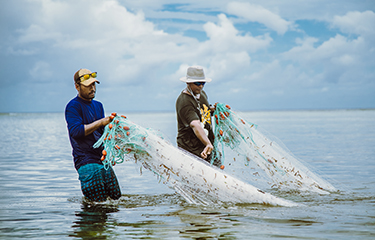A partnership between the Republic of the Marshall Islands and The Nature Conservancy will supply canned tuna to Walmart stores for the store’s Great Value brand across the United States.
The new joint venture, dubbed Pacific Island Tuna (PIT), is “designed to transform the global canned tuna supply chain,” according to a Nature Conservancy announcement. The new business model is intended to give Pacific islanders the ability to benefit from their tuna resources by directing 100 percent of long-term net profits back to them while utilizing a sustainable model of fishing and production.
“Pacific Island Tuna is showing the world that sustainability and profitability are not at odds, even in an industry that has been challenged by both,” PIT General Manager Gene Muller said. “Through close collaboration between resource owners and retailers, we can shape a different, more-resilient future for the tuna industry, and the communities that rely on it. We are confident that this model will be adopted across the industry, benefitting both people and the planet.”
Walmart has chosen the joint venture to supply it with Marine Stewardship Council-certified canned skipjack tuna for the company’s Great Value brand. PIT said it adheres to best-in-class environmental and labor standards in its supply chain, and supports the elimination of illegal, unreported, and unregulated (IUU) fishing. Walmart EVP and Chief Sustainability Officer Kathleen McLaughlin, said the partnership will be a win-win, benefitting both the Marshall Islands residents and Walmart.
“Sourcing from Pacific Island Tuna has a number of benefits for people and the planet – and is a good business decision for us,” McLaughlin said. “Our customers want us to provide affordable, consistent, quality products and to help improve supply chains to promote environmental and social sustainability. This collaboration aims to raise the bar on sustainable tuna sourcing and aligns well with our commitment to regenerative practices."
For the Marshall Islands, tuna plays an important role environmentally, culturally, and economically – nearly 90 percent of the nation’s non-aid income comes from the tuna industry. However, that income represents a fraction of the USD 26 billion (EUR 22.5 billion) global tuna market, according to TNC.
The new partnership will allow the nation to gain increased visibility in the tuna supply chain, and increase the amount of money that makes it back to the islands, TNC said.
As part of the deal, 40 percent of the net income will directly support community-based conservation and climate resilience projects in low-lying areas. As a low-lying island nation, climate resiliency efforts for the Marshall Islands as they try to counter the threat of rising sea levels – which can also have devasting effects on fisheries. The other 60 percent of profits will be returned to Pacific island governments, TNC said.
Marshall Islands President David Kabua said the venture and its partnership with TNC is a testament to the nation’s commitment to transparency within the seafood supply chain.
“We are honored to be working with an innovative partner like TNC and a large retailer like Walmart on this transformative business venture, which will promote economic and conservation development for our beloved country,” Kabua said.
Kabua said the partnership will also provide Marshall Islands' residents with better livelihoods.
“This approach maximizes benefits for our people, who will see investments in climate resilience, additional revenues for associated businesses, and the creation of new onshore and on-water job opportunities,” Kabua said. “We’re equally excited about the catalytic impact this arrangement will have on the world’s fishing industry. We believe more retailers will follow suit and commit to transparency within their seafood supply chains, while also seeing the value of working directly with the people and communities impacted most."
The Nature Conservancy CEO Jennifer Morris said the venture is a reflection of a business model that centers on a more collaborative relationship linking people and nature.
“Companies who lead in the next decade will be the ones who make long-term investments in true place-based, people-focused partnerships that drive transparent and resilient supply chains, environmental resilience, and socio-economic opportunity for those who rely on and care for nature,” Morris said. “We hope that Pacific Island Tuna’s exemplary sustainability practices will be adopted in fisheries all over the world, as a vital step towards helping our oceans at a critical moment for their health and protection.”
Photo by Chewy Lin, courtesy of The Nature Conservancy







